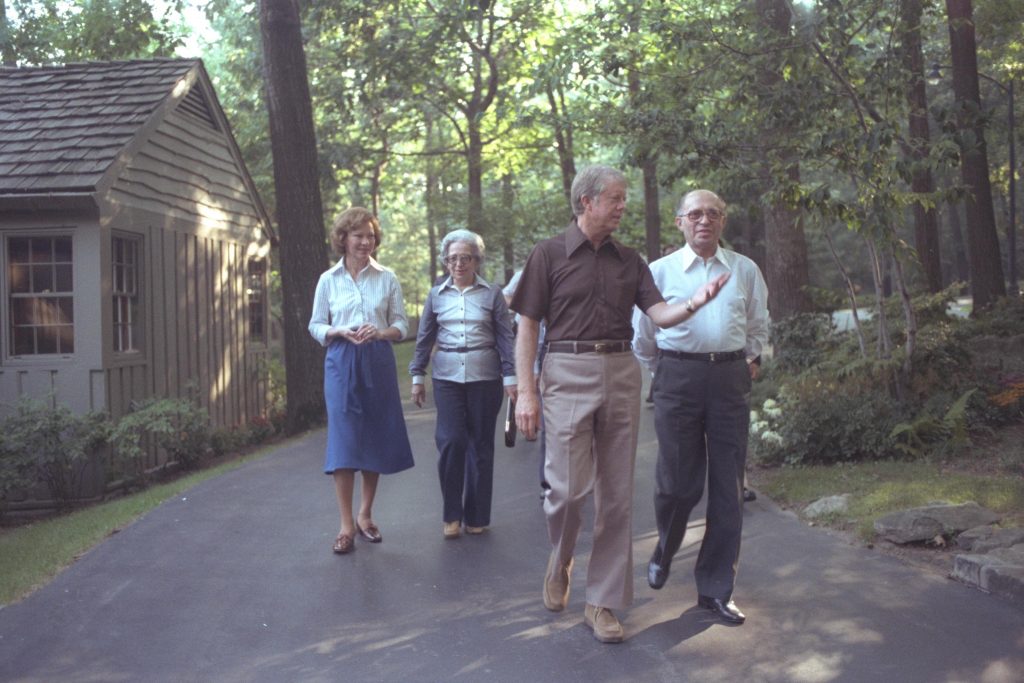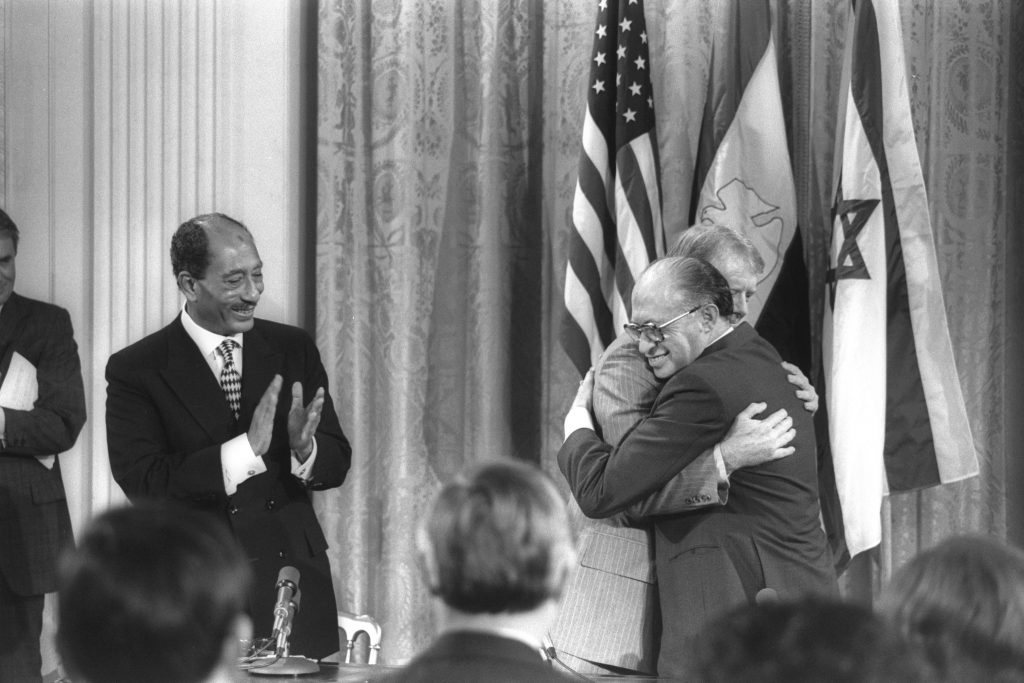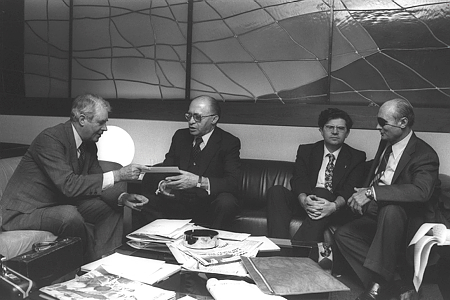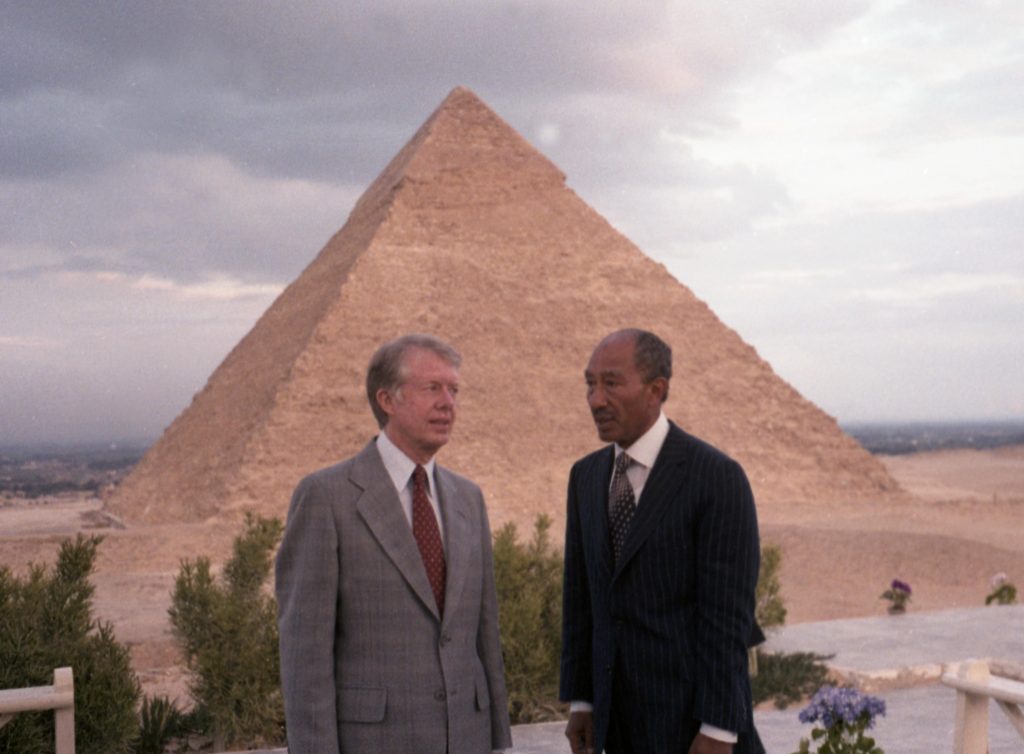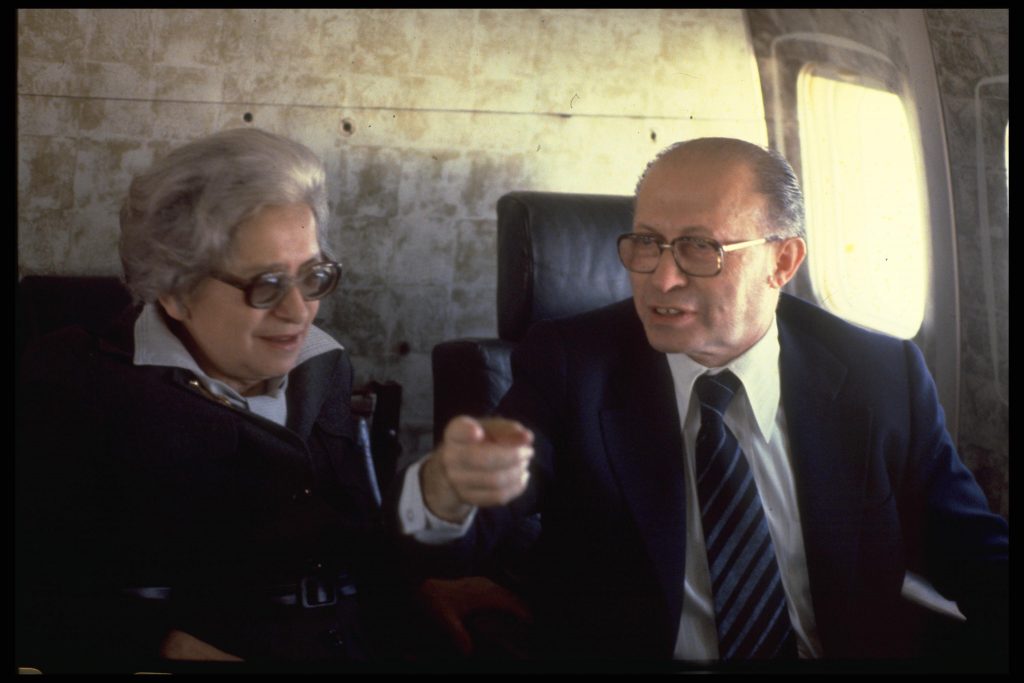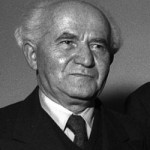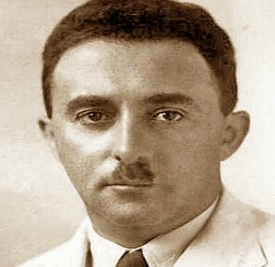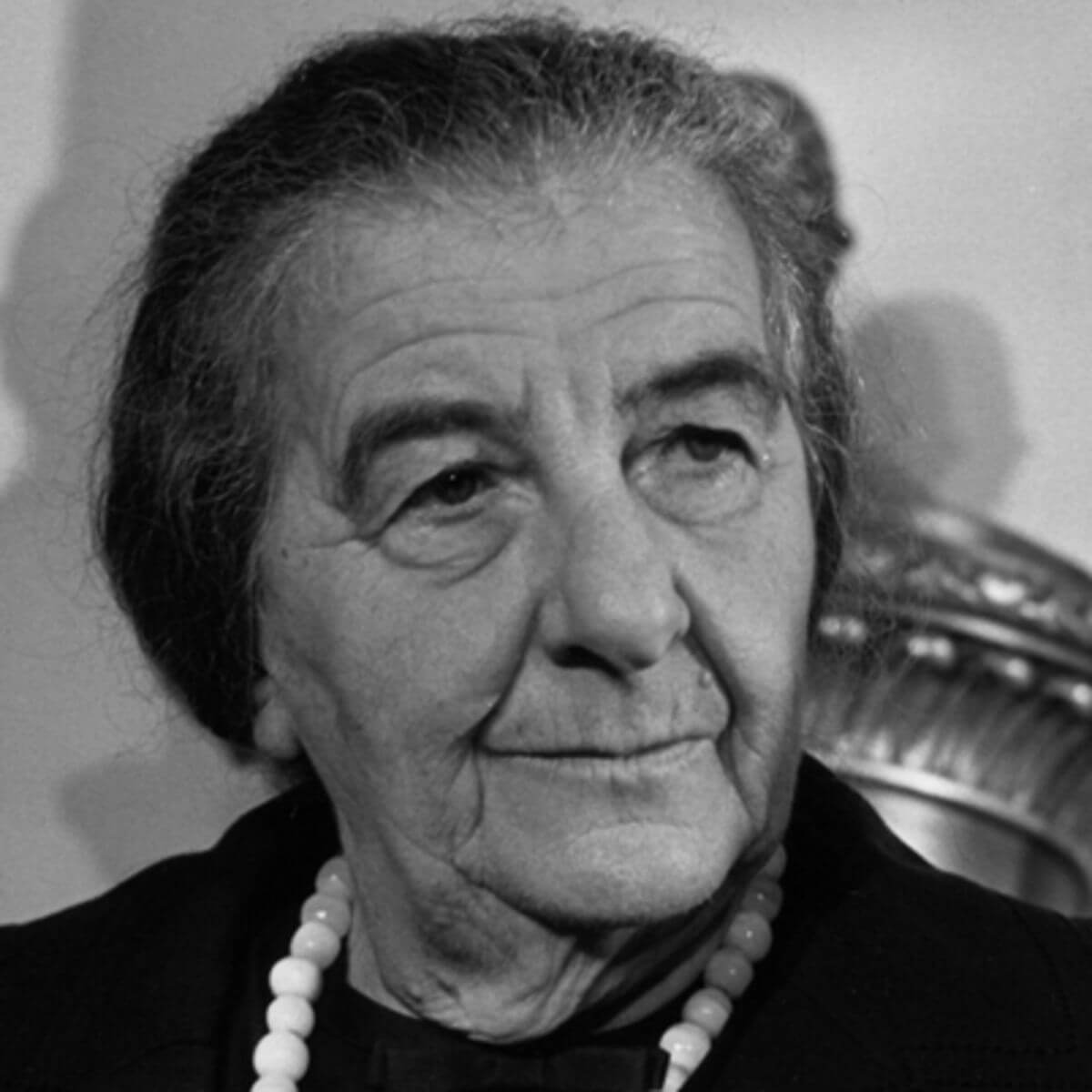Part 1. Renewing talks with Egypt, crisis and invitation to Camp David
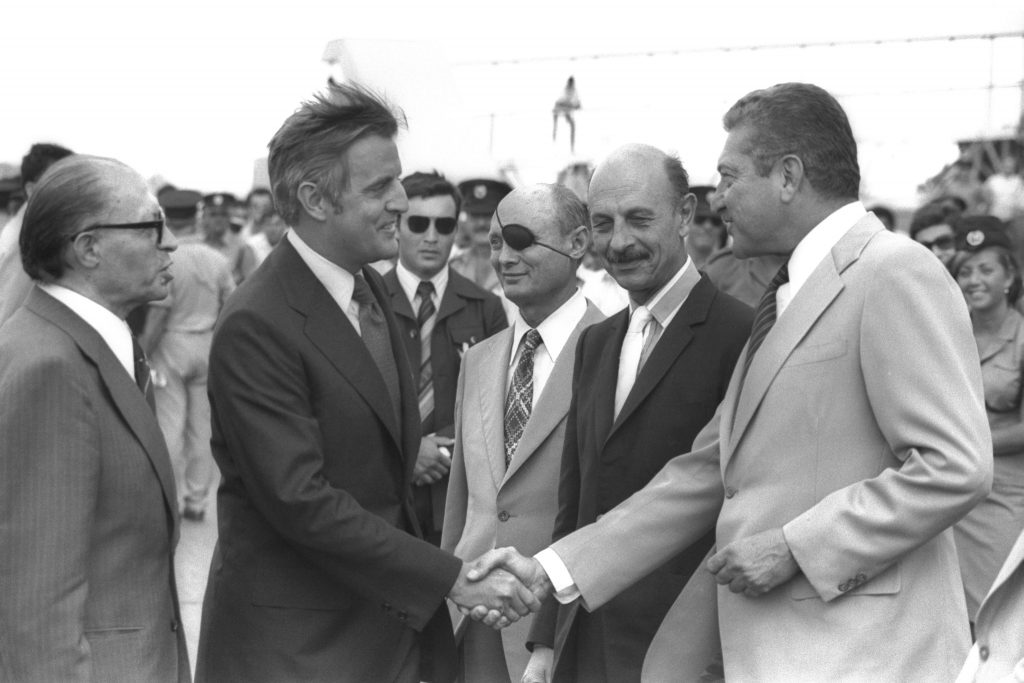
US Vice-President Mondale shaking hands with Defence Minister Weizman, Deputy PM Yadin and Foreign Minister Dayan on his arrival, 30 June 1978. PM Menachem Begin is on his left. Photograph: Ya’acov Sa’ar, GPO
- Vice-President Mondale’s visit to Israel
1. Meeting between US Vice-President Walter Mondale and Foreign Minister Moshe Dayan; Jerusalem, 2 July 1978
Israel State Archives, MFA/6866/6
In Dayan’s opinion the main question is whether Sadat is prepared to sign a separate agreement in the name of Egypt on Judea and Samaria, or at least on Gaza. If he continues to raise additional demands, or to wait for Jordanian participation, there is no point in renewing the talks. Mondale claims that a basis for continuing the negotiations exists.
1a. Meeting between US Vice-President Walter Mondale and Prime Minister Menachem Begin and Others; Jerusalem, 2 July 1978 (in English)
Israel State Archives, MFA/6866/6
The prime minister asks the US to act to restore the balance between Israel and the Arabs following the deal to sell planes to Saudi Arabia and other arms sales to Arab countries. Mondale explains the background to the invitation to the foreign ministers’ meeting in London, and to the presentation of Egypt’s peace plan. Begin announces that Israel is prepared to renew the talks unconditionally, but it must provide for its security needs. Ministers Yigael Hurvitz and Ariel Sharon express their reservations about withdrawal from Judea and Samaria.
2. US President Jimmy Carter, Washington, to Prime Minister Menachem Begin, Jerusalem; 4 July 1978 (in English)
Israel State Archives, A/4348/5
Confirms the invitation to the prime minister to send Foreign Minister Dayan for talks with Egyptian Foreign Minister Kamel and Secretary of State Vance in London on 18-19 July 1978. Accepts with thanks Begin’s positive response. The US will transmit Egypt’s peace proposal to Israel as soon as possible. “We must not let the present opportunity slip through our fingers”.
Appendix No. 1. Israel’s peace proposal as adopted by the government, 23 December 1977, A4313/6
Appendix No. 2. Egypt’s peace proposal in Hebrew and English, 5 July 1978, A4173/10
3. Simcha Dinitz, Israel Ambassador in Washington, to Foreign Minister Moshe Dayan, Jerusalem; 4 July 1978
Israel State Archives, A/4173/10
A talk with Mondale on his conclusions from his visit to Israel and Egypt. He urges Israel to agree immediately to send the foreign minister to London. He will try to persuade President Carter to make a public statement on his reservations about the Egyptian peace proposal. Sadat would prefer further talks in the Middle East, and is not interested in additional meetings with Israelis unless something new comes out of them. Mondale’s opinion on the balance of power within the US administration.
Ezer Weizman’s meeting with Sadat in Salzburg
4. Defence Minister Ezer Weizmann’s Report to the Foreign Affairs and Security Committee of the Knesset on his Meetings in Salzburg with President Anwar Sadat and Minister of Defence Mohamed Abd el-Gahani el-Gamasy on 13 July; Jerusalem, 25 July 1978
Israel State Archives, A/239/7
The defence minister believes that Sadat is still interested in a peace treaty and will accept a solution for Jerusalem that would not divide the city. Sadat emphasized the importance of momentum before the date of the renewal of the mandate of the UN peace-keeping force according to the interim agreement of 1975, in October 1978, and the first anniversary of his visit to Jerusalem in November 1978. Sadat said that he would like to pray at the site holy to Christians and Moslems at Saint Catherine’s monastery in Sinai, and proposed that Israel turn the site and the town of El Arish into an Egyptian enclave. It would become the centre of the peace talks. They also discussed security arrangements in Judea and Samaria.

View of Leeds Castle. Photograph: Wikimedia
3. The Leeds Castle conference of foreign ministers (17–19 July) and the Israeli government decision (23 July)
5. Meeting between US Secretary of State Cyrus Vance and Foreign Minister Moshe Dayan; Leeds Castle, Kent, 17 July 1978
Israel State Archives, A/4313/14
Also present were US Ambassador Samuel Lewis and the attorney-general, Aharon Barak. Dayan clarified the concessions that the Begin government could make in Judea and Samaria and the Gaza Strip. He asked whether Egypt might agree not to discuss the permanent status of these areas until the end of the interim period of five years. Israel would not agree to withdrawal and handing over the area to foreign sovereignty – not even for a defence agreement with the US. The Palestinians would be allowed to decide their future at the end of the period, in talks between Israel, Egypt, Jordan and their representatives, but not to establish a Palestinian state.
Appendix: Dayan’s position, as transmitted to Vance in a “Talking Paper”, in Hebrew and English, 18 July 1978
Dayan emphasized that this paper expressed a personal stand, but he would try to convince the government to adopt it.
6. Stenographic Record of the Afternoon Meeting with the Israeli, US and Egyptian Delegations; Leeds Castle, Kent, 19 July 1978
Israel State Archives, A/4173/11
The final meeting in which Dayan, Vance, Egyptian Foreign Minister Kamel and their delegations participated. Vance presented a press release, saying that the talks were frank and serious. He intended to return to the Middle East in approximately two weeks. The two sides had explained their positions, and the next time they met, they would have to present proposals for bridging the gap. Following questions by Dayan, a discussion was held on the significance of “minor modifications” of the borders and a possible solution to the Jerusalem issue.
7. Extracts from the Stenographic Record of the Meeting of the Israel Government; Jerusalem, 23 July 1978
Israel State Archives, A/4271/3
Dayan described the talks at the Leeds Castle conference, and said that Israel could expect a serious crisis with the US. He described the positions of the Egyptians and the “personal” paper that he had presented on Israel’s position, expressing willingness to discuss sovereignty in Judea and Samaria and the Gaza Strip after the interim period of five years. The prime minister confirmed the position presented by the foreign minister. According to Begin he had always supported that position, but the government decided on a different formula, and he did not object, due to his illness and his desire to avoid a government crisis.
In the second part of the meeting the government discussed Sadat’s request for a unilateral gesture of good-will in Sinai. Begin read out the negative reply he intended to send. Despite objections, he insisted on the wording of the letter and sending it formally to Sadat. (Begin’s letter was read out in the Knesset, and can be found in the Knesset Proceedings for 24 July 1978). The government approved Begin’s proposals and denounced the attacks by the Alignment party on the prime minister during his illness.
8. Information Division, Jerusalem, to the Israel Missions Abroad; 25 July 1978
Israel State Archives, A/4173/11
The main points of a talk by Dayan to division directors on 25 July: Dayan rejected the statement by Golda Meir that Sadat had come to Jerusalem because he had been promised the return of the Sinai. He presented the changes in Israel’s position at the Leeds Castle conference on the Palestinian issue, as approved by the government. In his opinion the government decision is the most important document issued by Israel to date.
Egypt breaks off the talks: invitation to Camp David
9. Ezer Weizman, Minister of Defence, Tel Aviv, to Colonel Yaacov Heichal, Cairo, for Mohamed Abdel-Ghani El-Gamassy; 26 July 1978 (in English)
Israel State Archives, A/8190/1
Weizmann expresses his regret at Egypt’s decision to send Israel’s military delegation home. He emphasizes the importance of the meetings between himself and Gamasy and of peace between their two nations.
10. Hanan Bar-On, Israel Minister in Washington, to Ephraim Evron, Director-General of the Ministry of Foreign Affairs, Jerusalem; 2 August 1978
Israel State Archives, A/8190/1
Sadat has decided to reject the idea of another meeting between representatives of Egypt and Israel at the American warning station at Um Hasheiba. Bar-On heard an assessment by William Quandt of the National Security Council. Bar-On commented that perhaps Sadat was disappointed not only by the lack of progress in negotiations with Israel, but also by the Americans’ lack of reaction to the Soviets’ latest maneouvres. In Quandt’s opinion it was not the Saudis who were influencing Sadat, but rather he who was exploiting and influencing them. He did not believe that Sadat’s threats not to renew the mandate of the UN peace-keeping force were realistic.
11. US President Jimmy Carter, Washington, to Prime Minister Menachem Begin, Jerusalem; 3 August 1978 (in English)
Israel State Archives, A/4348/5
An invitation to a summit with the president and President Sadat of Egypt at Camp David. According to the president, despite the differences between the two sides, there was a basis for agreement. The time had arrived for a renewed effort at the highest level. A similar document was sent to Sadat.
12. Elyakim Rubinstein, Deputy Director-General and Head of the Foreign Minister’s Bureau, Jerusalem, to Hanan Bar-On, Israel Minister in Washington; 11 August 1978
Israel State Archives, A/4173/13
Records the meeting of the prime minister and the ministers with Quandt on 9 August in Tel Aviv. Quandt flew with Vance to Egypt to bring Sadat the invitation to Camp David. He reported on the positive reaction of Sadat, who promised to curb the attacks by the Egyptian press on Israel. Sadat reassured Vance about the October 1978 deadline. He also said that every leader at Camp David must be in a position not only to discuss the issues, but also to decide. The second part of the meeting was devoted to the situation in Lebanon.
Preparations for the Camp David conference in Israel
13. Ephraim Evron, Director-General of the Ministry of Foreign Affairs, Jerusalem to Simcha Dinitz, Israel Ambassador in Washington; 27 August 1978
Israel State Archives, A/4155/14
Main points of the prime minister’s meeting with US ambassador Samuel Lewis, who was about to leave for Washington. Begin said that he would propose to President Carter to ensure the continuation of direct negotiations and to hold continuous talks until they reached an agreement. If asked to discuss guidelines for the agreement, Israel would gladly do so. If agreement was reached, the conference would be fully successful; if not, the continuation of negotiations would be a partial success. Israel was ready to discuss a partial agreement if there were reciprocal concessions by the Egyptians. Begin rejected any possibility of allowing foreign forces, including the UN, into Judea and Samaria and the Gaza Strip, but Israel would accept joint patrols in the Sinai. He also discussed the source of authority for the autonomy.
14. Statement by Foreign Minister Moshe Dayan at a Meeting of Department Directors; Jerusalem, 31 August 1978
Israel State Archives, MFA/6913/1
Dayan’s assessment on the eve of the Camp David summit. He states that for thirty years there has not been an opportunity as good as this one to reach peace. In his opinion, the Palestinians are interested in living in peace with Israel within open borders.
14a. Statement by Foreign Minister Moshe Dayan at a Meeting with the Prime Minister’s Mission of the United Jewish Appeal, Jerusalem; 30 August 1978 (in English)
Israel State Archives, MFA/6913/1
Another assessment on the eve of Camp David. In reply to questions, Dayan discussed the importance of demilitarization in the Sinai and the difficulties of Israeli public relations in the US. In his view the conflict could not be resolved without a solution to the refugee problem.
15. Simcha Dinitz, Israel Ambassador in Washington, to Foreign Minister Moshe Dayan and Ephraim Evron, Director-General of the Ministry of Foreign Affairs, Jerusalem; 31 August 1978
Israel State Archives, MFA/4173/13
His meeting with Vice-President Mondale. After hearing the views of Begin and Dayan on Israel’s expectations from the Camp David conference, Mondale commented that the Americans saw it as an opportunity that might not recur. Only Sadat could reach a decision on behalf of Egypt. Thus the summit should be used to make decisions about principles or guidelines that would serve as a basis for a settlement, and not just to set a date for more discussions. Sadat could reply to questions that Israel had been asking for a long time about the agreement, and these answers would be binding.
16. Meeting between Foreign Minister Moshe Dayan and Minister of Agriculture Ariel Sharon; 1 September 1978
Israel State Archives, MFA/6913/7
Describes Israel’s settlement plans in Judea and Samaria (the West Bank) and the most essential areas in Sharon’s opinion. According to him, if Israel makes concessions at Camp David, it would be best to lean towards greater autonomy for the Arab residents, and he objected to increased Jordanian influence in Judea and Samaria. Dayan expressed apprehension that a Palestinian state would allow the return of large numbers of refugees. In his opinion, most of the residents were interested in a link with Jordan. His main concern was that at Camp David – “I wouldn’t want us to accept any obligation that would hinder the continuation of our work”.
17. Meeting between Israel Ambassador in Washington Simcha Dinitz and Secretary of State Cyrus Vance, Washington; 2 September 1978
Israel State Archives, MFA/6866/11
Vance’s impressions of internal consultations in the State Department and the National Security Council, on the eve of the Camp David conference. The president rejected modest proposals, and has set the bar high. He is interested in real progress towards a peace agreement between Israel and Egypt and a framework of principles for an agreement on the Palestinian issue. Vance pointed to the concessions required from Israel, so that Sadat would be able to claim that he received some commitment to the principle of withdrawal. The US has promised that they would not present any proposal of their own without first consulting with Israel.
18. Consultation by the Israeli Delegation to Camp David with Yitzhak Hofi, Head of the Mossad, the Institute for Intelligence and Special Operations; New York, 4 September 1978
Israel State Archives, A/4155/15
Dinitz presents the information he received from Vance and President Carter’s aides on their preparations for the conference and their expectations from Israel. Begin clarifies Israel’s position on the status of Judea and Samaria and the Gaza Strip. Israel will not withdraw and will not agree to Arab sovereignty, but is prepared to leave the issue open. With regard to the settlements in Sinai, there is a national consensus not to evacuate them. Dayan proposes to raise the issue of the crises in Iran and Lebanon, in order to emphasize Israel’s security needs, which are beyond transient geopolitical changes.

